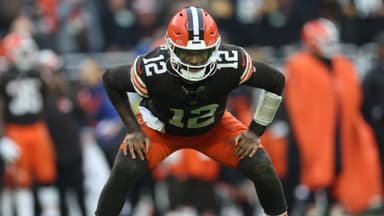NIL deals have given players leverage over college programs. So, Tennessee QB Nico Iamaleava decided to make it count. The 20-year-old reportedly began holding out from the Vols’ practices, demanding $4 million per year from the program.
Advertisement
However, Tennessee was not about to bend to Nico’s will. The Volunteers were looking at Nico for a leadership role in the team and were considering retaining him on an estimated $2.4 million per year contract. His demand apparently forced their hand into moving on from the QB and exploring other options.
Emmanuel Acho, the former Eagles linebacker who played college football for the Texas Longhorns, feels that Iamaleava brought this upon himself.
“Your coach kicked you off the team because you wanted to hold out. You want to act like a pro, he’s going to treat you like a pro. Cautionary tale, remember DJ Uiagalelei?” Acho said in a tweet.
The analyst added how Uiagalelei was a five-star recruit out of high school and had multiple teams drooling over his services when he entered the transfer portal. But, DJ burnt out quickly. He transferred to Oregon State and did alright, but then transferred to Florida State, where he had a disastrous season. Now, he’s projected to go undrafted in the 2025 NFL Draft.
UNLV quarterback Matthew Sluka also left their program midseason because he claimed he didn’t receive the $100k that he was promised.
But Nico perhaps felt that it made sense for him to go to the transfer portal (which has its opening on April 16). Because of this move, the likes of Carson Beck (Miami) and Darian Mensah (Duke) have bagged deals close to $4 million.
Acho talked about the controversy and its aftermath further, sharing three pointers that could help prevent another issue like this in the future.
“Number one, shame on you, NCAA. You got us here. Because of your incompetence and persistence to take advantage of the college athlete, now the college athletes have to overcorrect.”
The NCAA seemingly baked NIL into its system without fully considering the potential issues that could follow. Moreover, their reluctance to part with a bigger share of the massive revenue they generate has only made matters worse.
“Second thing, college athletes, be mindful,” Acho continued. “Do not give up what you want most for what you want now. What do I mean? Often, what you want most is to play in the NFL. What you want now is to make money. I get it, do both if you can. But be mindful… College athletes still have a lot to prove.”
Another great point that Acho makes, and it’s something that Iamaleava should remember next time before he holds out. The goal is to get to the NFL. But now, his future is up in the air and unknown.
“Lastly… Don’t fight over peanuts… College athletes should be fighting over the TV revenue,” Acho added.
This might be a bit of wishful thinking, but it’s an interesting idea. Acho believes that every team should have a GM responsible for allocating a certain percentage of money to the players from the TV revenue. Since that revenue reaches into the billions, he argues it should be shared with the athletes.
The completely fractured and decaying state of college football, and the Nico Iamaleava situation.
A nuanced take: pic.twitter.com/TOyZe9LqOK
— Emmanuel Acho (@EmmanuelAcho) April 12, 2025
All in all, it was a good monologue from Acho. He ended it by saying he doesn’t like where college football has gotten nowadays, and deemed it unrecognizable. And he’s somewhat right.
It feels like we’re in the Wild Wild West of college sports with NIL right now. There aren’t a ton of rules and regulations set up around it, and it’s led to complete chaos. Players are transferring too often, while schools and the NCAA continue to hoard too much of the revenue. We’re also starting to see it affect the excitement of college sports more.
The first-ever 12-team College Football Playoff was deemed a bust by many. There were hardly any upsets, and the teams with the highest NIL payrolls all made it through to the finals. The NCAA March Madness tournament also took a hit, with just two major upsets in the first round, and the Final Four featuring all number one seeds for the first time since 2007.
It’s fun to watch some of the best players compete against each other. But this doesn’t feel like the spirit of college sports. Like Acho believes, something needs to change, and it needs to start with either scrapping the NIL system or modifying it to not let money get into players’ heads or them controlling their college football teams.








